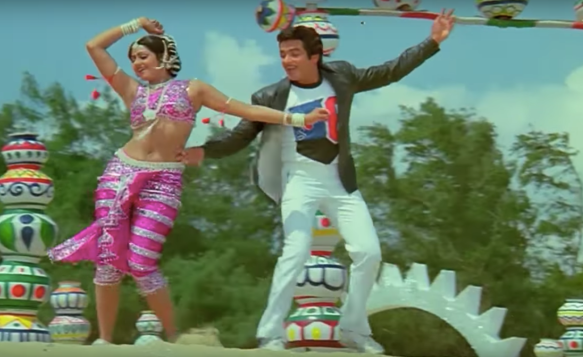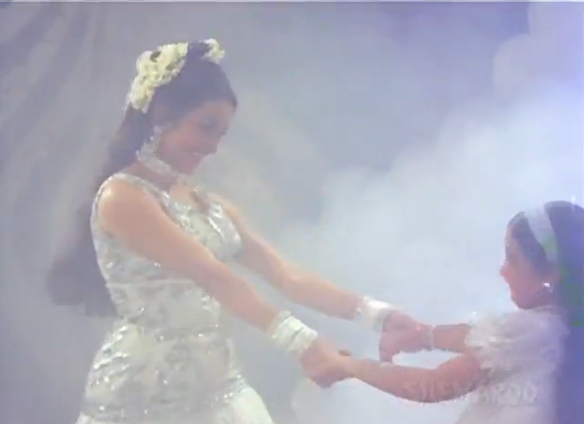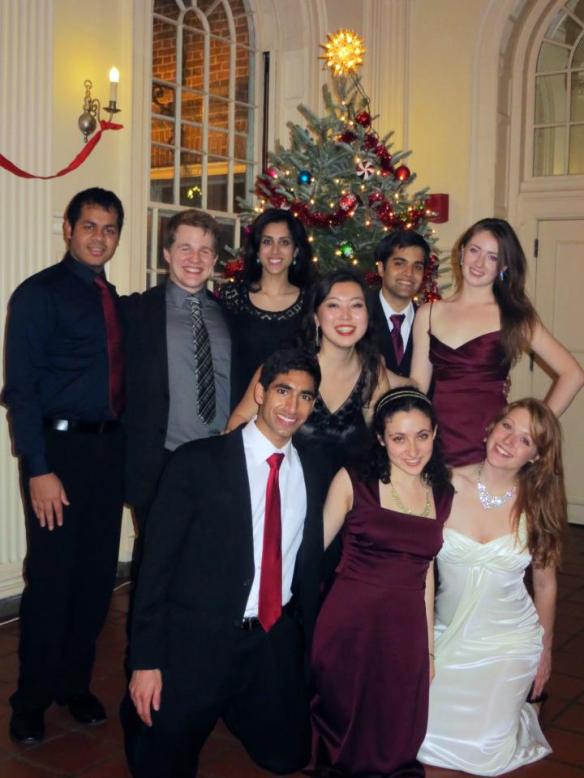
The untimely demise of Sridevi at the age of 54 on February 24, 2018 has struck fans of Indian cinema across the globe. Today, in honor of Sridevi’s legacy, we present the lyrics and English translation to “Nainon Mein Sapna” from her first superhit Bollywood film Himmatwala (1983).
Sridevi’s acting career began at the age of four and would go on to include 300 films over the span of more than four decades. As an actress in South Indian language films, Sridevi’s early performances highlight her capacity to portray nuanced roles without the glamor and glitz that pervaded the Bollywood industry. Sridevi’s first foray into the world of Hindi cinema as a leading lady occurred in Solva Sawan (1979), but her rise to Bollywood stardom occurred as the heroine in K. Raghavendra Rao’s Himmatwala (1983), a Hindi remake of the Telegu film Ooruki Monagadu.
Regarding her early success with Himmatwala, Sridevi has said in a 1987 interview:
In Tamil films they love to see me act naturally. But in Hindi films all they want is lot of glamour, richness and masala. My bad luck was that my first big hit in Hindi films turned out to be a commercial one (Himmatwala). When I did a character role in Sadma, the picture flopped. So people started casting me only for glamour roles. But one day I’m going to prove to everyone that I can act also.
Following Himmatwala, Sridevi had a string of Bollywood hits in the 1980s and ’90s, soon becoming one of the most sought after actresses in the industry. Some of her most notable works include Mr. India (1987), Chandni (1989), Chaalbaaz (1989), Lamhe (1991) and Khuda Gawah (1992). After a 15-year hiatus following her controversial marriage to Boney Kapoor, Sridevi made an endearing comeback in English Vinglish (2012) as a Hindi-speaking housewife who takes on learning English for the first time in Manhattan. Most recently, Sridevi starred in Mom (2017) as a vigilante mother who avenges the rape of her daughter, which was the actress’s 300th and final appearance on screen before her death.
With her unparalleled charisma and signature big eyes, Sridevi won the hearts of millions of fans across the world. Given her massive popularity and exceptional body of work, she is widely considered to be Bollywood’s first female superstar. As we mourn the untimely loss of an icon, we send our heartfelt condolences to Sridevi’s family during this difficult time.
Do you have a favorite song featuring Sridevi? Let us know in the comments!
-Mr. ’55
Nainon Mein Sapna: Lyrics and English Translation
LATA: naino.n me.n sapnaa
In my eyes, there is a dream.
sapno.n me.n sajnaa
In my dreams, I see my beloved.
sajnaa pe dil aa gayaa
My heart has fallen for my beloved.
kyo.n sajnaa pe dil aa gayaa?
Why has my heart fallen for my beloved?
kaii albele dekhe
I have seen many unique sights
javaanii ke rele dekhe
I have seen processions of youth.
hasiino.n ke mele dekhe
I have seen gatherings of beautiful women.
dil pe tu hii chhaa gayaa
But it is only you that reigns over my heart.
KISHORE: naino.n me.n sapna
In my eyes, there is a dream.
sapno.n me.n sajnii
In my dreams, I see my beloved.
sajnii pe dil aa gayaa
My heart has fallen for my beloved.
ki sajnii pe dil aa gayaa
My heart has fallen for my beloved.
LATA: tuu nahii.n, mai.n nahii.n
There is not just you or just me.
ab dil ik hai
Our hearts are now united as one.
do tan ik praan, do dil ik jaan
Two bodies with one soul, two hearts with one life.
manzil ik hai
We now have the same destination.
KISHORE: arre ang se ang mile
Oh! As our bodies unite,
armaa.n khil gaye
our desires have blossomed.
purab paschim se, paschim purab se
From West to East and East to West,
kaise mil gaye
we have met in strange ways.
pyaar ke zamaane mile
I have been given a new world of love,
husn ke khazaane mile
I have been given a beautiful treasure,
jiine ke bahaane mile
I have been given a reason to live,
man me.n jo tuu aa gayaa
Once you entered my heart.

LATA: saanche me.n tere hii
In your mold,
mai.n to Dhal gayii
I shaped myself.
tuu ne toDaa hai, aisaa moDaa hai
You broke and twisted me
ho gayii mai.n nayii
to give me a new shape.
KISHORE: arre saa.nso.n me.n ho.nTho.n pe
Oh! In my breaths and on my lips,
teraa hii naam hai
only your name resides.
lenaa denaa hai kyaa mujhe duniyaa se?
I have nothing to give or take from this world,
tujh se kaam hai
for I am only attached to you.
rangii.n nazaare mile
I have seen colorful sights,
tuufaa.n me.n kinaare mile
I have found the shore amidst a storm,
dil ke sahaare mile
I have found comfort for my heart,
dil me.n jo tuu aa gaya
Once you entered my heart.
LATA: naino.n me.n sapnaa
In my eyes, there is a dream.
sapno.n me.n sajnaa
In my dreams, I see my beloved.
sajnaa pe dil aa gayaa
My heart has fallen for my beloved.
kyo.n sajnaa pe dil aa gayaa?
Why has my heart fallen for my beloved?
Glossary
sapnaa: dream; sajnaa: beloved; albelaa: unique; javaanii: youth; relaa: procession, surge; hasiinaa: beautiful women; melaa: gathering, fair; chhaa jaanaa: to reign, dominate; praan: soul; manzil: destination; ang: body; armaa.n: desire; khil jaanaa: to blossom; purab: East; paschim: West; zamaanaa: world; husn: beauty; khazaanaa: treasure; bahaanaa: reason, excuse; saanchaa: mold; toDnaa: to break; moDnaa: to twist; saa.ns: breath; ho.nTh: lip; lenaa: to take; denaa: to give; kaam: task, obligation; rangii.n: colorful; nazaaraa: sight, scene; tuufaa.n: storm; kinaaraa: shore; sahaaraa: comfort, support.









